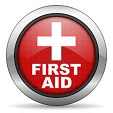World First Aid Day: Why First Aid Skills Are Important

The second Saturday of September marks World First Aid Day, providing an opportunity to further raise awareness about how first aid saves lives in critical situations.
According to the Global First Aid Reference Centre, World First Aid Day highlights the importance of first aid around the globe as:
- An act of humanitarian empowerment.
- A key component of a wider resilience approach.
- An occasion to reach a wider public audience and try to change the way the world thinks about first aid.
Having basic knowledge of first aid will allow you to provide immediate care to a family member, co-worker or stranger to prevent further injury and mitigate life-threatening conditions.
First aid in the digital world
The 2023 theme for World First Aid Day is “First aid in the digital world.” Technology has brought basic first aid knowledge to the masses by putting it at our fingertips before and during a first aid emergency situation.
With a quick internet search, you can access a variety of first aid digital resources and online learning programs.
Have a tooth injury? Use your phone to look up what you need to do to save the tooth. Need to help an injured person with a strain or sprain? Quickly search whether you’re supposed to use heat or an ice pack for swelling and pain relief.
Free, readily available resources online can be used as a reference when responding to common injuries that don’t require additional medical help. But the importance of first aid training can’t be overlooked.
The importance of first aid skills training
Many medical emergencies require quick action from a trained bystander to save a person’s life.
For example, workplace accidents can quickly lead to shock if immediate steps aren’t taken to control severe bleeding. Alternatively, a severe allergic reaction can become deadly within minutes without treatment (e.g., epinephrine autoinjector).
Additionally, there might be times when internet access is limited, such as during a natural disaster.
Therefore, you shouldn’t solely rely on finding and understanding the first aid resources you need in the chaos of the moment.
First aid certified people have the training to provide appropriate first aid care for everyday life, as well as during life-threatening situations where professional help from emergency services might be delayed.
Full CPR, AED and First Aid training gives students the knowledge and confidence to respond to a variety of medical emergencies. This includes but isn’t limited to:
- Sudden cardiac arrest
- Heart attack or stroke
- Seizure
- Choking relief
- Diabetic medical emergency
- Asthma attacks
- Burns
- Eye injuries
- Poisoning
- Heat and cold emergencies
CPR, AED and First Aid training courses teach simple techniques to provide medical assistance for adults, children and infants.
I liked the interactive part.Joan, student
